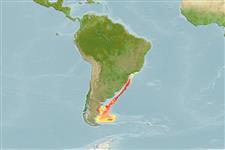分类 / Names
俗名 | 同种异名 | Catalog of Fishes(属, 种) | ITIS | CoL | WoRMS | Cloffa
Elasmobranchii
板鳃亚纲 (鲨鱼与 鱼) (sharks and rays) >
Squatiniformes (Angel sharks)
琵琶鮫目 (Angel sharks) >
Squatinidae (Angel sharks)
琵琶鮫科(Angel sharks) (Angel sharks)
Etymology: Squatina: Latin for skate, which angel sharks superficially resemble, presumably tautonymous with Squalus squatina Linnaeus 1758 (no species mentioned). (See ETYFish); argentina: Presumably named for Argentina, described from off the coast of Buenos Aires (the province, not the city). (See ETYFish).
Environment: milieu / climate zone / depth range / distribution range
生态学
海洋 居于水底的; 深度上下限 100 - 400 m (Ref. 57911). 亞熱帶的; 19°S - 53°S, 68°W - 38°W (Ref. 54901)
Southwest Atlantic: Brazil to southern Uruguay.
西南大西洋: 巴西南部到阿根廷。
大小 / 重量 / 年龄
Maturity: Lm ? range ? - 120 cm
Max length : 170 cm TL 雄鱼/尚未辨别雌雄; (Ref. 247); common length : 100.0 cm TL 雄鱼/尚未辨别雌雄; (Ref. 6077)
This species is distinguished from its congeners by having a darker background color, ranging from dark-brown to reddish-brown (vs. light-brown to dark-brown in S. guggenheim and S. occulta), with higher number of tooth rows with 24 vertical tooth rows in both upper and lower jaws, tooth formula 12-12/12-12; (vs. 9-9 to 10-10/9-9 to 11-11 in S. occulta, and 9-9 to 11-11/9-9 to 11-11 in S. guggenheim), and with anterior half of pectoral fin margin convex (vs. anterior margin of pectoral fin straight); differs from S. guggenheim and S. occulta with the interspiracular surface covered by small and homogeneous dorsal denticles, without enlarged denticles (vs. a pair of enlarged, conical and morphologically distinct dermal denticles between spiracles in S. occulta and S. guggenheim); differs from S. occulta by lacking blackish irregular small spots surrounding white spots on dorsal surface (i.e. absence of ocelli-like markings); differs further from S. guggenheim by having the dorsal midline denticles on trunk morphologically similar to other trunk denticles and barely organized in a row (vs. dorsal midline row of enlarged denticles morphologically distinct from other trunk denticles), the denticles close to origin of pectoral fin morphologically homogeneous, similar to other pectoral denticles (vs. presence of a pair, or more, enlarged and morphologically distinct denticles from other pectoral denticles, in S. guggenheim) (Ref. 95520).
Found on the continental shelf and slope. Ovoviviparous (Ref. 50449).
栖息于大陆架及大陆坡了。 卵胎生的.(参考文献 50449)
Life cycle and mating behavior
Maturities | 繁殖 | Spawnings | Egg(s) | Fecundities | 仔鱼
Ovoviviparous, embryos feed solely on yolk (Ref. 50449). Both ovaries are functional (Ref. 57911).西南大西洋: 巴西南部到阿根廷。
Vaz, D.F.B. and M.R. De Carvalho, 2013. Morphological and taxonomic revision of species of Squatina from the Southwestern Atlantic Ocean (Chondrichthyes: Squatiniformes: Squatinidae). Zootaxa 3695(1):001-081. (Ref. 95520)
人类利用
渔业: 自给性渔业
工具
特别资料
下载 XML
网络资源
Estimates based on models
Preferred temperature (Ref.
123201): 4 - 16.3, mean 6.1 °C (based on 18 cells).
Phylogenetic diversity index (Ref.
82804): PD
50 = 0.5000 [Uniqueness, from 0.5 = low to 2.0 = high].
Bayesian length-weight: a=0.00676 (0.00293 - 0.01558), b=3.07 (2.88 - 3.26), in cm total length, based on LWR estimates for this Genus-body shape (Ref.
93245).
营养阶层 (Ref.
69278): 4.1 ±0.6 se; based on diet studies.
回复力 (Ref.
120179): 非常低的, 最小族群倍增时间超过14 年 (Fec 7-11).
Fishing Vulnerability (Ref.
59153): Very high vulnerability (90 of 100).
Climate Vulnerability (Ref.
125649): High to very high vulnerability (71 of 100).
Nutrients (Ref.
124155): Calcium = 8.08 [1.10, 152.92] mg/100g; Iron = 0.689 [0.065, 8.563] mg/100g; Protein = 18.4 [16.3, 20.6] %; Omega3 = 0.288 [0.108, 0.796] g/100g; Selenium = 34.1 [6.7, 171.6] μg/100g; VitaminA = 5.73 [0.45, 68.92] μg/100g; Zinc = 0.355 [0.021, 4.093] mg/100g (wet weight);
